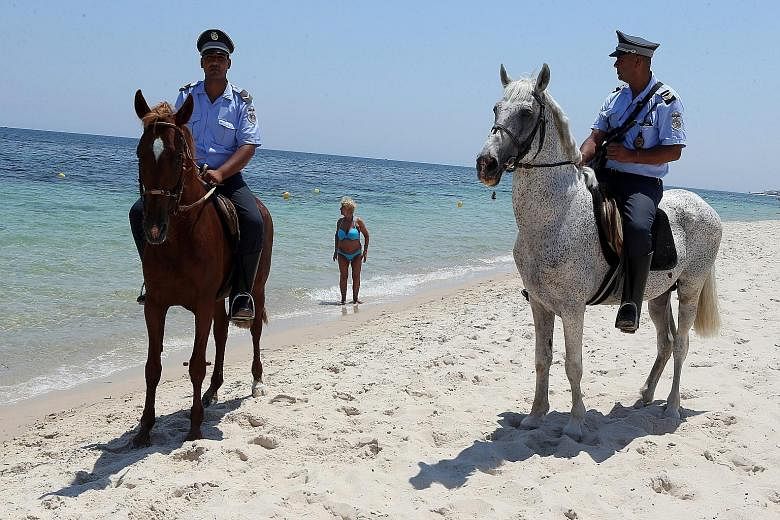LONDON • Tourists rushed to leave Tunisia yesterday after Britain warned another attack was "highly likely", two weeks after a gunman killed 38 foreign holidaymakers at a beachside hotel. Most of the victims were British.
Tunisia's ambassador to Britain suggested that the warning played into the hands of militants, saying they would feed on the hopelessness that would grip the country if its tourism industry collapsed.
The French foreign ministry said it was not planning to follow the British move but would continue to advise its citizens to be vigilant.
Tourism accounts for about 7 per cent of the economy and is a major source of foreign currency and employment.
Islamist militant Saif Rezgui used a Kalashnikov to gun down tourists at a beach hotel in Sousse on Tunisia's Mediterranean coast, the biggest loss of British lives in such an incident since the July 2005 bombings in London.
"Since the attack in Sousse, the intelligence and threat picture has developed considerably, leading us to the view that a further terrorist attack is highly likely," British Foreign Secretary Philip Hammond said in a statement.
He said that more work was needed to protect tourists in Tunisia and that British tourists were instructed to leave. Tour operators put on extra flights to return some of the estimated 3,000 Britons holidaying in the country.
The Islamic State in Iraq and Syria (ISIS) group claimed responsibility for the attack in Tunisia, which is struggling to curb growing Islamist militancy despite its relatively peaceful transition to democracy after the 2011 Arab Spring uprising.
Tunisia has now deployed about 3,000 armed policemen in hotels and on beaches to protect tourists.
Tunisia was doing all it could to protect British interests, Prime Minister Habib Essid said, adding that he would call British Prime Minister David Cameron to offer assurances on the safety of tourists.
Mr Essid told Parliament that London's warning would "have repercussions" for Britain, although he did say what they might be.
Hundreds of British tourists were waiting at Enfidha Airport close to the main resorts of Sousse and Hammamet yesterday.
"It's been difficult and we feel for the Tunisian people because it's their livelihood," said Christian, a British tourist.
"But now we have no choice, we have to go home."
Last year about 400,000 Britons holidayed in Tunisia, compared with 425,000 from Germany and 760,000 from France.
Meanwhile, Turkey yesterday detained 21 suspected ISIS members, including three foreigners, during a major operation in several cities that included Istanbul, state media reported .
Those detained were suspected of helping ISIS recruit people from Europe and assisting them to travel to Syria, the official Anatolia news agency said.
The operation appeared to be the largest one yet to target ISIS suspects in Turkey, with arrests in Istanbul for the first time.
REUTERS, AGENCE FRANCE-PRESSE

